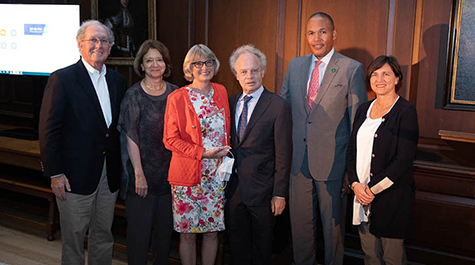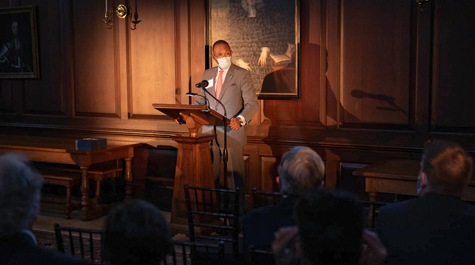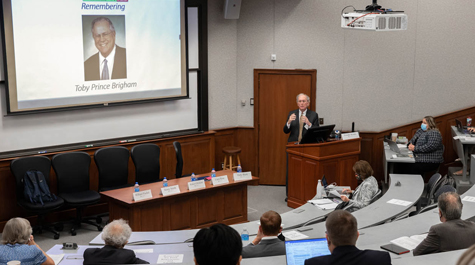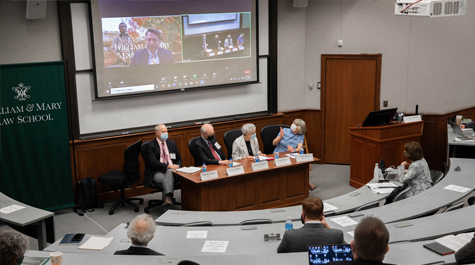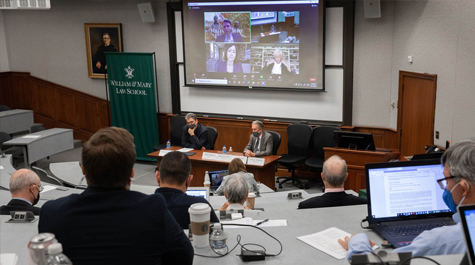William & Mary Law School Awards Annual Property Rights Prize to NYU’s Vicki Been
On September 30, Professor Vicki Been of NYU Law School became the 18th recipient of the annual Brigham-Kanner Property Rights Prize from the William & Mary Law School Property Rights Project.
Been received the award during a Zoom-broadcast ceremony that officially opened the annual Brigham-Kanner Property Rights Conference at William & Mary Law School. Now in its 18th year, the conference brings together members of the bench, bar and academia to explore recent developments in the law that affect property rights.
“The Brigham-Kanner Prize is awarded annually to someone who has thought deeply about property’s relationship to the human condition and about the importance of property to fundamental rights and societal well being,” said Lynda Butler, Chancellor Professor of Law, Emerita, and Director of William & Mary Law School’s Property Rights Project. “This year’s recipient, Vicki Been, stands firmly in this tradition of excellence.”
Butler described Been as “an innovative scholar who does not shy from difficult issues, testing positions and proposals in the field with empirical methods.” Butler added that Been’s “empirical analysis has stood the test of time, providing important lessons about the intersection of land use controls, environmental laws and property rights.”
Been is the Judge Edward Weinfeld Professor of Law at NYU School of Law, an Affiliated Professor of Public Policy of the NYU Wagner Graduate School of Public Service, and a Faculty Director of NYU’s Furman Center for Real Estate and Urban Policy. Her scholarship focuses on the interplay of land use, urban policy and housing. She is currently on leave from NYU, serving as Deputy Mayor for Housing and Economic Development for the City of New York.
Among other topics, Been has examined inclusionary zoning, historic preservation, affordable housing, gentrification, mortgage foreclosure, racial and economic integration, community benefit agreements, and the effects of supportive housing developments on neighbors. She often uses the City of New York as her laboratory.
Been also writes about the Fifth Amendment prohibition against the taking of property without just compensation, environmental justice, and international protections for property owners. She is a co-author of a leading land use casebook, Land Use Controls.
The Brigham-Kanner Property Rights Prize is named in honor of the lifetime contributions to property rights of Toby Prince Brigham, founding partner of Brigham Moore, LLP, and Gideon Kanner, professor of law emeritus at Loyola Law School in Los Angeles. Brigham died on March 19, 2021, in Miami. A true legend in the law, he was esteemed by colleagues for the invaluable counsel, knowledge and skills he possessed and shared so generously.
As in previous years, Andrew Brigham, Toby Brigham's son and a member of the conference planning committee, was in attendance, albeit this time virtually. Unable to attend in person, Brigham, Managing Partner of the Brigham Property Rights Law Firm, PLLC in Jacksonville, Fla., provided remarks via Zoom during the awards ceremony and moderated a panel the following afternoon.
Renowned for its outstanding panel discussions, the Brigham-Kanner Property Rights Conference was inspired by William & Mary Law School alumnus Joseph T. Waldo ’78, who suggested the conference during the Campaign for William & Mary (2000-07). The conference is notable for its encouragement of active participation from the audience through its question-and-answer segments with each of the panels.
Accepting her award in the Great Hall of William & Mary’s historic Sir Christopher Wren Building, Professor Been said she was “honored and humbled to be selected to join the incredibly talented group of scholars and practitioners and justices who have received the Brigham-Kanner Property Rights Prize.”
Been added that she has “been blessed over the years to be at many of these conferences and watch the incredible people before me get this award; I have been blessed to work with many of the smart and talented and creative and dedicated and passionate people in this room.”
The following day, scholars and practitioners, both in person and virtual, participated in panel discussions and moderated sessions. The event began with Joseph Waldo’s heartfelt tribute to Toby Prince Brigham. Subsequent panel topics included: “The Role of Empirical Research in Defining the Scope of Constitutionally Protected Property Rights: A Tribute to Been”; “The Relationship between Eminent Domain and Social and Racial Injustice”; a roundtable on “Just Compensation Issues, Changing Public Uses, and Other Recent Developments”; “The Interdependence of Property and First Amendment Rights” and “The Distributional Implications of Land Use Regulation.”
Although headquartered at William & Mary, the conference has an international reach, and has twice been held overseas. William & Mary cosponsored the 2011 conference with Tsinghau Law School in Beijing, China, and the 2016 conference with the Grotius Center of International Legal Studies at the World Court in The Hague, Netherlands.
Been joins an esteemed list of Brigham-Kanner Property Rights Prize winners. Previous recipients include Frank I. Michelman (2004), Richard Epstein (2005), James W. Ely, Jr. (2006), Margaret Jane Radin (2007), Robert C. Ellickson (2008), Richard E. Pipes (2009), Carol Rose (2010), retired Supreme Court Justice Sandra Day O’Connor (2011), James E. Krier (2012), Thomas W. Merrill (2013), Michael M. Berger (2014), Joseph William Singer (2015), Hernando de Soto (2016), David L. Callies (2017), Stewart E. Sterk (2018), Steven J. Eagle (2019) and Henry Smith (2020).
Papers from the conference will be published in Volume 10 (2021) of the Brigham-Kanner Property Rights Journal, published by the William & Mary Law School Property Rights Project.
About William & Mary Law School
Thomas Jefferson founded William & Mary Law School in 1779 to train leaders for the new nation. Now in its third century, America's oldest law school continues its historic mission of educating citizen lawyers who are prepared both to lead and to serve.
